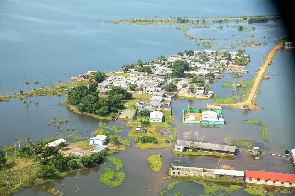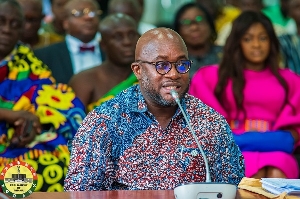Opinions of Monday, 23 October 2023
Columnist: Dr. Elikplim Kwabla Apetorgbor
Akosombo Dam spillage victims deserve restoration and restitution, not relief items
The Akosombo Dam spillage in Ghana is a recurring operational activity that affects the lives and livelihoods of countless people living along the Volta River.
The victims of this avoidable disaster are going through immense frustration, hardship, and exposure to all manner of unfavorable conditions and they deserve much more than temporary relief items.
I share my thoughts on why the government and the Volta River Authority (VRA), should shift their approach from offering mere favors of cosmetic relief items to providing comprehensive restoration and restitution to those affected.
1. A persistent problem
The Akosombo Dam spillage is not an isolated incident; it is a recurrent issue, necessary to protect the dam from overtopping caused by heavy rainfall and others. Relief items, while a temporary solution, do not address the underlying problem. To truly help the victims, a more comprehensive approach is required.
2. Economic hardships
The victims of the Akosombo Dam spillage are already grappling with the harsh economic conditions that prevail in Ghana. The economy has a direct impact on the financial well-being of the flood victims. Providing them with relief items alone is insufficient to address these economic hardships.
3. Dignity and empowerment
When relief items are provided as favors or support, it can inadvertently undermine the dignity of the flood victims. Such an approach portrays them as passive recipients of charity rather than as individuals capable of rebuilding their lives. The victims deserve the opportunity to regain their sense of agency, responsibility, and pride.
4. Environmental sustainability
The Akosombo Dam spillage is closely linked to environmental factors. Merely offering relief items without addressing the root causes of this environmental disaster perpetuates the problem. Sustainable solutions, such as improved environmental management practices and infrastructure, are essential to reduce the frequency and severity of future spills.
5. Long-Term community resilience
The most effective way to assist the affected communities is to invest in their resilience. Restitution programs that focus on infrastructure development, education, and employment opportunities can empower these communities to withstand future crises and promote long-term stability.
6. Social responsibility
The government and VRA have a social responsibility to their citizens, especially when their infrastructure contributes to a disaster. Restitution is an acknowledgment of this responsibility, demonstrating a genuine commitment to the well-being of those affected by the dam spillage.
In light of the recurrent Akosombo Dam spillage, it is crucial to understand that the victims are not seeking mere favors or support. What they truly need is comprehensive restoration and restitution to rebuild their lives and communities, regain their dignity, address the underlying economic issues, and work towards a sustainable future.
Relief items, while well-intentioned, fall short of addressing the root causes and the long-term needs of the flood victims. By prioritizing a more holistic approach that empowers these communities and promotes their resilience, the government and the VRA can truly make a difference in the lives of those affected by this ongoing disaster.
Dr. Elikplim Kwabla Apetorgbor
CEO, Independent Power Generators, Ghana













